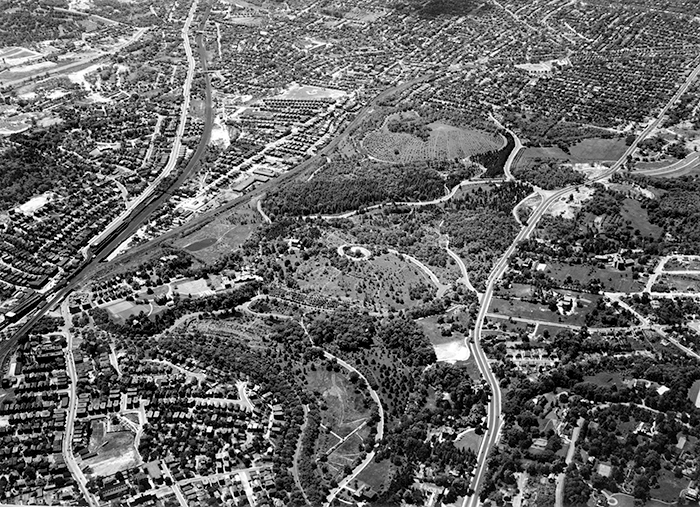Dario Rodighiero is an Assistant Professor of Science and Technology Studies at the University of Groningen, where he is involved in programs that bridge data science with society. Based at the interdisciplinary faculty Campus Fryslân, he coordinates the minor Data Wise and teaches data and visual literacy within the Data Science and Society Bachelor’s program. He maintains active collaborations with Harvard University, where he is a faculty associate at the Berkman Klein Center for Internet & Society and a principal at metaLAB—a research and teaching laboratory dedicated to experimenting with digital technologies in the arts and humanities.
Combining computational techniques with design, Dario investigates how complex information can be revealed. Grounded in Science and Technology Studies, his research focuses on the mapping of science: he is the author of Mapping Affinities: Democratizing Data Visualization, which proposes new ways to design organizational charts. His work further engages with digital cultural archives, exploring questions of representation, interpretation, and self-identification. Visualization is approached as a method for knowledge design, bridging critical inquiry and design practice to foster reflection and dialogue by opening new visual modes of understanding.
Dario holds a PhD from the École polytechnique fédérale de Lausanne (EPFL), where he attended the doctoral program Architecture and Sciences of the City. He has held research and teaching positions at MIT, the European Commission, Paris-Sorbonne University, and Sciences Po. The collaboration with Bruno Latour at the médialab shaped his engagement with digital platforms as tools for philosophical inquiry and collective exploration. He lectured at venues such as CERN and Ars Electronica, and exhibited his work at the MAXXI and Harvard Art Museums, reflecting a sustained commitment to public engagement and interdisciplinary collaboration.
Anthology of Computers and the Humanities
2025
https://doi.org/10.63744/fkFGJ6wSzDPV
2025
Moving Pictures of Thought: Extracting Visual Knowledge in Charles S. Peirce’s Manuscripts with Vision-Language Models
Pedretti, Carlo Teo, Davide Picca, and Dario Rodighierohttps://doi.org/10.63744/fkFGJ6wSzDPV
Diagrams are crucial yet underexplored tools in many disciplines, demonstrating the close connection between visual representation and scholarly reasoning. However, their iconic form poses obstacles to visual studies, intermedial analysis, and text-based digital workflows. In particular, Charles S. Peirce consistently advocated the use of diagrams as essential for reasoning and explanation. His manuscripts, often combining textual content with complex visual artifacts, provide a challenging case for studying documents involving heterogeneous materials. In this preliminary study, we investigate whether Visual Language Models (VLMs) can effectively help us identify and interpret such hybrid pages in context. First, we propose a workflow that (i) segments manuscript page layouts, (ii) reconnects each segment to IIIF-compliant annotations, and (iii) submits fragments containing diagrams to a VLM. In addition, by adopting Peirce’s semiotic framework, we designed prompts to extract key knowledge about diagrams and produce concise captions. Finally, we integrated these captions into knowledge graphs, enabling structured representations of diagrammatic content within composite sources.

IEEE VIS Arts Program (VISAP)
2025
https://doi.org/10.48550/arXiv.2509.00114
2025
Living Library of Trees: Mapping Knowledge Ecology in Arnold Arboretum
Malmstedt, Johan, Giacomo Nanni, and Dario Rodighierohttps://doi.org/10.48550/arXiv.2509.00114
As biodiversity loss and climate change accelerate, botanical gardens serve as vital infrastructures for research, education, and conservation. This project focuses on the Arnold Arboretum of Harvard University, a 281-acre living museum founded in 1872 in Boston. Drawing on more than a century of curatorial data, the research combines historical analysis with computational methods to visualize the biographies of plants and people. The resulting platform reveals patterns of care and scientific observations, along with the collective dimensions embedded in botanical data. Using techniques from artificial intelligence, geospatial mapping, and information design, the project frames the arboretum as a system of shared agency—an active archive of more-than-human affinities that records the layered memory of curatorial labor, the situated nature of knowledge production, and the potential of design to bridge archival record and future care.

IEEE VIS Arts Program (VISAP)
2025
https://doi.org/10.48550/arXiv.2509.03071
2025
AI-Generated Images for Representing Individuals: Navigating the Thin Line Between Care and Bias
Ahrend, Julia C., Björn Döge, Tom M. Duscher, and Dario Rodighierohttps://doi.org/10.48550/arXiv.2509.03071
This research discusses the figurative tensions that arise when using portraits to represent individuals behind a dataset. In the broader effort to communicate European data related to depression, the Kiel Science Communication Network (KielSCN) team attempted to engage a wider audience by combining interactive data graphics with AI-generated images of people. This article examines the project's decisions and results, reflecting on the reaction from the audience when information design incorporates figurative representations of individuals within the data.
